The AMD 2nd Gen Ryzen Deep Dive: The 2700X, 2700, 2600X, and 2600 Tested
by Ian Cutress on April 19, 2018 9:00 AM ESTCPU Encoding Tests
One of the interesting elements on modern processors is encoding performance. This includes encryption/decryption, as well as video transcoding from one video format to another. In the encrypt/decrypt scenario, this remains pertinent to on-the-fly encryption of sensitive data - a process by which more modern devices are leaning to for software security. Video transcoding as a tool to adjust the quality, file size and resolution of a video file has boomed in recent years, such as providing the optimum video for devices before consumption, or for game streamers who are wanting to upload the output from their video camera in real-time. As we move into live 3D video, this task will only get more strenuous, and it turns out that the performance of certain algorithms is a function of the input/output of the content.
All of our benchmark results can also be found in our benchmark engine, Bench.
7-Zip 9.2: link
One of the freeware compression tools that offers good scaling performance between processors is 7-Zip. It runs under an open-source licence, is fast, and easy to use tool for power users. We run the benchmark mode via the command line for four loops and take the output score.
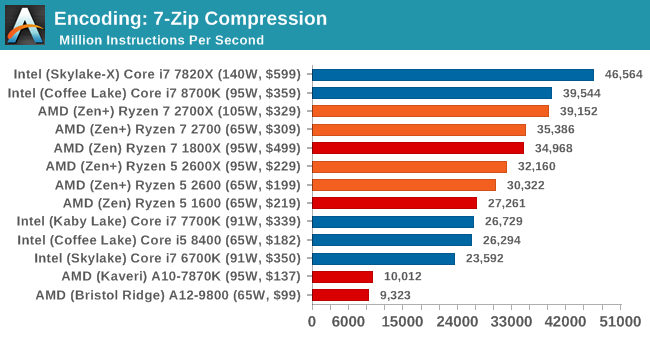
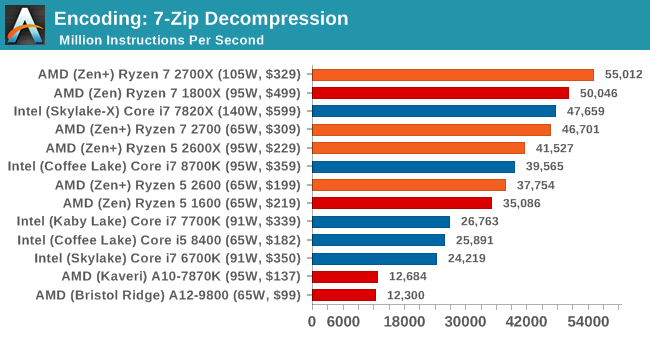
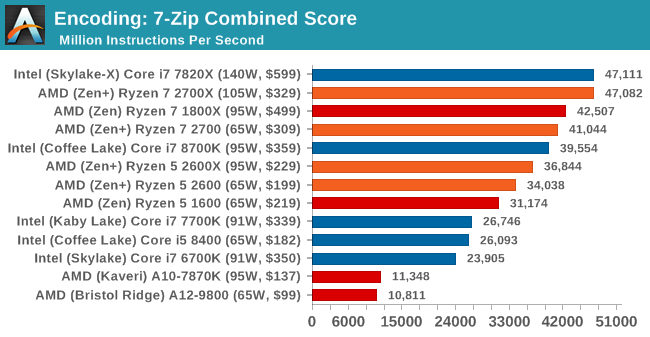
WinRAR 5.40: link
For the 2017 test suite, we move to the latest version of WinRAR in our compression test. WinRAR in some quarters is more user friendly that 7-Zip, hence its inclusion. Rather than use a benchmark mode as we did with 7-Zip, here we take a set of files representative of a generic stack (33 video files in 1.37 GB, 2834 smaller website files in 370 folders in 150 MB) of compressible and incompressible formats. The results shown are the time taken to encode the file. Due to DRAM caching, we run the test 10 times and take the average of the last five runs when the benchmark is in a steady state.
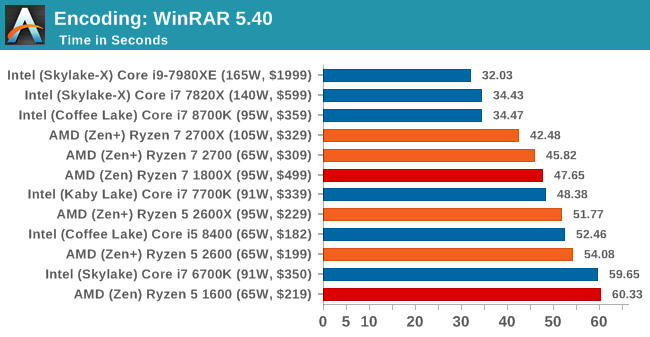
WinRAR requires a good memory base, so we see the quad-channel processors heading up the pack. The high IPC of the Core i7-8700K also does well.
AES Encoding
Algorithms using AES coding have spread far and wide as a ubiquitous tool for encryption. Again, this is another CPU limited test, and modern CPUs have special AES pathways to accelerate their performance. We often see scaling in both frequency and cores with this benchmark. We use the latest version of TrueCrypt and run its benchmark mode over 1GB of in-DRAM data. Results shown are the GB/s average of encryption and decryption.
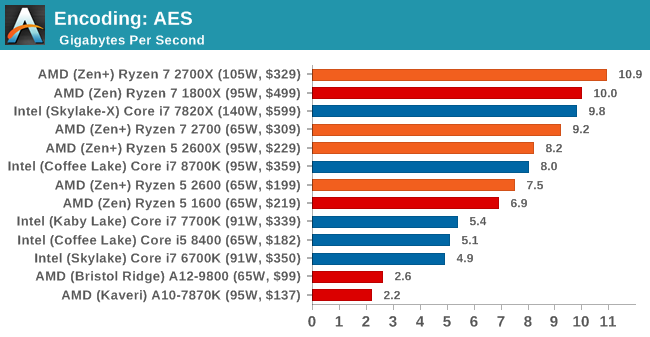
HandBrake v1.0.2 H264 and HEVC: link
As mentioned above, video transcoding (both encode and decode) is a hot topic in performance metrics as more and more content is being created. First consideration is the standard in which the video is encoded, which can be lossless or lossy, trade performance for file-size, trade quality for file-size, or all of the above can increase encoding rates to help accelerate decoding rates. Alongside Google's favorite codec, VP9, there are two others that are taking hold: H264, the older codec, is practically everywhere and is designed to be optimized for 1080p video, and HEVC (or H265) that is aimed to provide the same quality as H264 but at a lower file-size (or better quality for the same size). HEVC is important as 4K is streamed over the air, meaning less bits need to be transferred for the same quality content.
Handbrake is a favored tool for transcoding, and so our test regime takes care of three areas.
Low Quality/Resolution H264: Here we transcode a 640x266 H264 rip of a 2 hour film, and change the encoding from Main profile to High profile, using the very-fast preset.
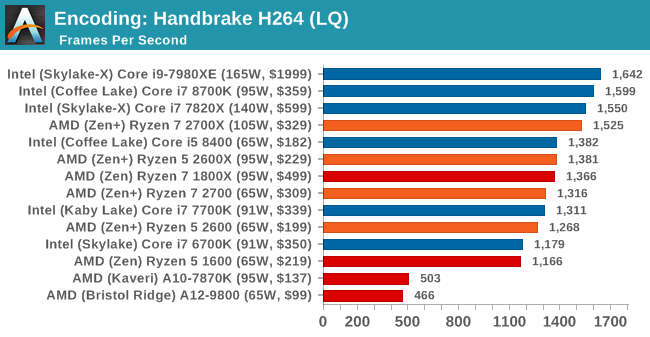
High Quality/Resolution H264: A similar test, but this time we take a ten-minute double 4K (3840x4320) file running at 60 Hz and transcode from Main to High, using the very-fast preset.
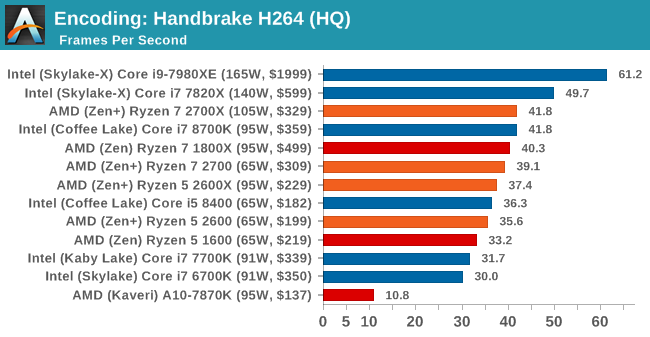
HEVC Test: Using the same video in HQ, we change the resolution and codec of the original video from 4K60 in H264 into 4K60 HEVC.
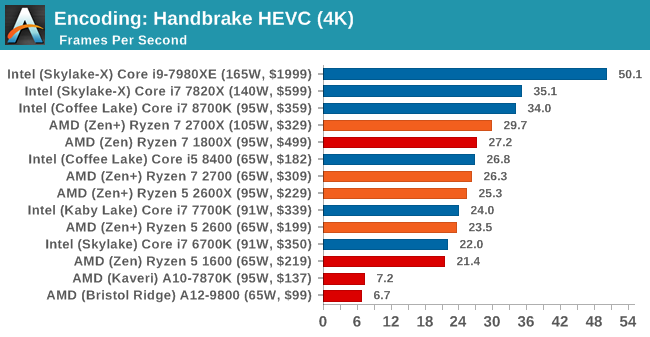
For HandBrake video encoding of large frames, there is a bump with the new Ryzen-2000 series processors over the previous generation, however there is still a gap up to the Core i7-8700K. The Core i5-8400 puts in a good showing here, above all but the best Ryzen parts.










545 Comments
View All Comments
MDD1963 - Friday, April 20, 2018 - link
The Gskill 32 GB kit (2 x 16 GB/3200 MHz) I bought 13 months ago for $205 is now $400-ish...andychow - Friday, April 20, 2018 - link
Ridiculous comment. 7 years ago I bought 4x8 GB of RAM for $110. That same kit, from the same company, seven years later, now sells for $300. 4x16GB kits are around $800. Memory prices aren't at all the way they've always been. There is clear collusion going on. Micron and SK Hynix have both seen their stock price increase 400% in the last two years. 400%!!!!!The price of RAM just keeps increasing and increasing, and the 3 manufacturers are in no hurry to increase supply. They are even responsible for the lack of GPUs, because they are the bottleneck.
spdragoo - Friday, April 20, 2018 - link
You mean a price history like this?https://camelcamelcamel.com/Corsair-Vengeance-4x8G...
Or perhaps, as mentioned here (https://www.techpowerup.com/forums/threads/what-ha... how the previous-generation RAM tends to go up in price once the manufacturers switch to the next-gen?
Since I KNOW you're not going to claim that you bought DDR4 RAM 7 YEARS AGO (when it barely came out 4 years ago)...
Alexvrb - Friday, April 20, 2018 - link
I love how you ignored everyone that already smushed your talking points to focus on a post which was likely just poorly worded.RAM prices have traditionally gone DOWN over time for the same capacity, as density improves. But recently the limited supply has completely blown up the normal price-per-capacity-over-time curve. Profit margins are massive. Saying this is "the same as always" is beyond comprehension. If it wasn't for your reply I would have sworn you were simply trolling.
Anyway this is what a lack of genuine competition looks like. NAND market isn't nearly as bad but there's supply problems there too.
vext - Friday, April 20, 2018 - link
True. When prices double with no explanation, there must be collusion.The same thing has happened with videocards. I have great doubts about bitcoin mining as a driver for those price increases. If mining was so profitable, you would think there would be a mad scramble to design cards specifically for mining. Instead the load falls on the DYI consumer.
Something very odd is happening.
Alexvrb - Friday, April 20, 2018 - link
They DO design things specifically for mining. It's called an ASIC miner. Unfortunately for us, some currencies are ASIC-resistant, and in some cases they can potentially change the algorithm, which makes such (expensive!) development challenging.Samus - Friday, April 20, 2018 - link
Yep. I went with 16GB in 2013-2014 just because I was like meh what difference does $50-$60 make when building a $1000+ PC. These days I do a double take when choosing between 8GB and 16GB for PC's I build. Even hardcore gaming PC's don't *NEED* more than 8GB, so it's worth saving $100+Memory prices have nearly doubled in the last 5 years. Sure there is cheap ram, there always has been. But a kit of quality Gskill costs twice as much as a comparable kit of quality Gskill cost in 2012.
FireSnake - Thursday, April 19, 2018 - link
Awesome, as always. Happy reading! :)Chris113q - Thursday, April 19, 2018 - link
Your gaming benchmarks results are garbage and every other reviewer got different results than you did. I hope no one takes this review seriously as the data is simply incorrect and misleading.Ian Cutress - Thursday, April 19, 2018 - link
Always glad to see you offer links to show the differences.We ran our tests on a fresh version of RS3 + April Security Updates + Meltdown/Spectre patches using our standard testing implementation.